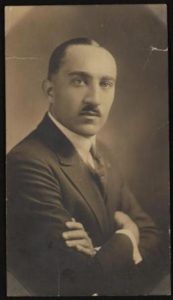
C. L. Dellums
*C. L. Dellums was born on this date in 1900. He was a Black labor activist.
Born in Corsicana, Texas, Cottrell Laurence Dellums “had chosen San Francisco as the ideal place for a Negro to live in 1923.” Dellums stated, "I wanted to be a lawyer, and the University of California had the best law school.” Instead, however, Dellums went to work for the Southern Pacific railroad as a Pullman porter, where he gained the respect of his Black coworkers. He worked as a Pullman Porter for the Pullman Company from 1924 to 1927 and was partially discharged due to his open support of unionization.
In 1929, Dellums was elected vice president of the Brotherhood of Sleeping Car Porters and became president in 1966. In the 1930s, Dellums was an officer in the NAACP Branch Office in Berkeley, California. After the war, Dellums became the standard-bearer of a growing African American labor movement in Oakland, Richmond, and San Francisco. As Dellums later explains, “Negroes will have to pay for their organization, their fights, by their funds as well as their energy.” Dellums's Brotherhood and other Black railroad workers' unions were built with “Negro leadership and Negro money,” using the solidarity forged within segregation sites to wage confrontations against racial discrimination.
The union also became known for its social activism beyond the world of train porters. For many years, Dellums tackled such issues as police brutality and the miserable conditions in which Black agricultural workers existed. Dellums was leading in launching the Oakland Voters League (OVL) in the mid-1940s. This labor-civil rights coalition temporarily wrestled control of the Oakland City Council from the conservative Republican bloc that had dominated city politics for many years through voter suppression. Dellums with the OVL drew their strength from building an organization and a new notion of political intersectionality and community bonding among the city's multiracial working class. Fair Employment Practices Committee.
A. Philip Randolph and Dellums were instrumental in opening war industries to Blacks by threatening a massive “March on Washington” if Roosevelt did not respond to Black pleas for non-discriminatory hiring in war industries. In response, Roosevelt issued an executive order establishing a Fair Employment Practice Committee (FEPC), which urged that defense plants be opened to African Americans. Not all labor officials who favored fair employment laws supported putting the FEPC question on the ballot. Dellums opposed placing the question before voters.
He later said: “We should never set a precedent that we recognize that the people have a right to vote on anything they want to vote on. The rights I have been fighting for all my life, they are now called civil rights, I call human rights, God-given rights. White people have been using their majority and their control of the law enforcing agencies and firearms to prevent us from exercising our God-given rights…. We were never really asking white people to grant or give us any rights. Only to stop using their majority and power in preventing us from exercising our God-given rights.”
Dellums played a leading role in the subsequent fourteen-year effort to win the approval of the FEPC measure within the state legislature. Governor Pat Brown appointed him to serve on the state's first Fair Employment Practices Commission in 1960. In 1964, Dellums and the California Fair Employment Practices Commission published “A Report on Oakland Schools,” which provided a window into the structural problems within the district because hiring discrimination is one of the biggest obstacles to making the Oakland Unified School District receptive to its growing Black student body. C. L. Dellums, the uncle of former Congressman and Mayor of Oakland Ron Dellums, died on December 6, 1989.